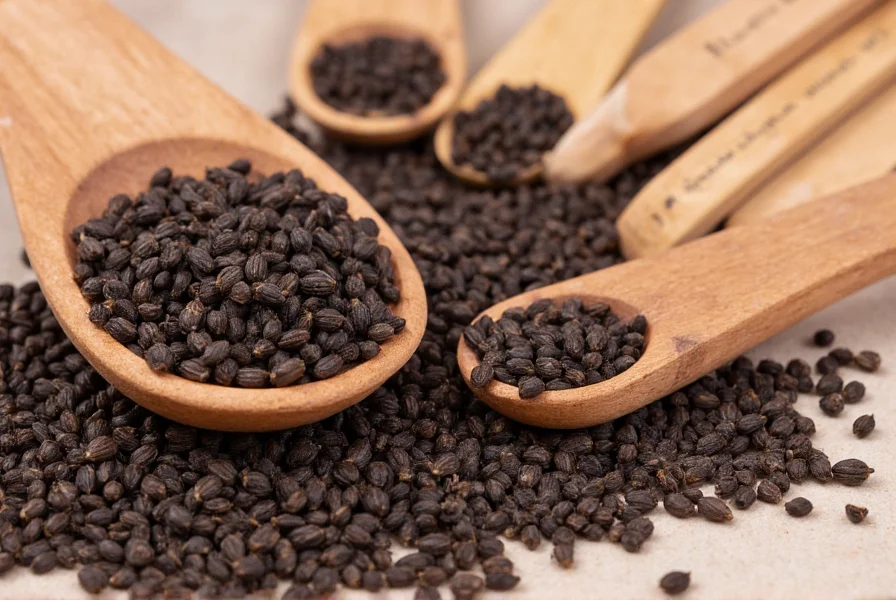For thousands of years, black cumin (Nigella sativa) has been revered across Middle Eastern and Asian cultures not just as a culinary spice but as a medicinal powerhouse. This small, black seed—distinct from regular cumin—grows in Eastern Europe, Western Asia, and the Middle East, and has earned the Arabic designation "habbat al-barakah" (seed of blessing) for its versatile therapeutic applications. Modern scientific research has begun validating many traditional claims while uncovering new potential health applications for this ancient remedy.
Understanding Black Cumin: More Than Just a Spice
Black cumin seeds contain over 100 bioactive compounds, with thymoquinone representing the most extensively studied component responsible for many therapeutic effects. Unlike regular cumin (Cuminum cyminum), black cumin belongs to the Ranunculaceae family and features a distinctive pungent, slightly bitter flavor profile. The seeds' dark color and characteristic aroma come from their rich concentration of essential oils, alkaloids, and saponins that contribute to their medicinal properties.
Scientifically-Supported Health Benefits of Black Cumin
Powerful Anti-Inflammatory Effects
Multiple clinical studies confirm black cumin's significant anti-inflammatory properties. Research published in the Journal of Ethnopharmacology demonstrated that thymoquinone inhibits inflammatory pathways by reducing cytokines like TNF-α and IL-6. This mechanism explains why black cumin shows promise in managing conditions like rheumatoid arthritis and inflammatory bowel diseases. When examining black cumin seed oil for inflammation, researchers found it compares favorably to conventional anti-inflammatory medications but with fewer side effects.
Immune System Modulation
One of the most compelling black seed oil immune system benefits involves its dual action as both an immune enhancer and regulator. A 2020 review in Phytotherapy Research highlighted how black cumin increases natural killer cell activity while preventing excessive immune responses that lead to allergies and autoimmune conditions. This immunomodulatory effect makes it particularly valuable during seasonal changes when immune support becomes crucial.
Cardiovascular Protection
Regular consumption of black cumin shows measurable benefits for heart health. Clinical trials indicate it helps maintain healthy blood pressure levels and improves lipid profiles by reducing LDL cholesterol while increasing HDL. The antioxidant properties protect blood vessels from oxidative damage, potentially reducing atherosclerosis risk. These cardiovascular benefits of black cumin make it a valuable dietary addition for those concerned about heart health.
Blood Sugar Regulation
For individuals monitoring glucose levels, black cumin offers promising support. A meta-analysis in Complementary Therapies in Medicine concluded that black seed supplementation significantly reduces fasting blood glucose and HbA1c levels. The mechanism appears to involve enhanced insulin sensitivity and pancreatic beta-cell function. Those exploring natural approaches for metabolic health should consider these evidence-based black cumin seed benefits.
| Form of Black Cumin | Best For | Recommended Daily Amount | Notes |
|---|---|---|---|
| Whole Seeds | Culinary use, digestive health | 1-2 teaspoons | Crush before consumption for maximum benefit |
| Seed Oil | Skin conditions, inflammation | 1-2 teaspoons | Can be taken orally or applied topically |
| Capsule Supplements | Consistent dosing, specific health goals | Follow product instructions | Look for standardized thymoquinone content |
Respiratory Health Support
Traditional use of black cumin for respiratory conditions finds strong support in contemporary research. Studies show black seed oil benefits for asthma management by reducing bronchial inflammation and improving lung function. The European Respiratory Journal published findings where participants using black cumin oil experienced fewer asthma attacks and reduced medication dependence. These respiratory benefits of black cumin make it particularly valuable during high-pollution periods or seasonal challenges.
Skin Health Applications
Topical application of black cumin seed oil demonstrates impressive results for various skin conditions. Clinical trials report significant improvement in eczema symptoms, psoriasis plaques, and acne lesions with regular use. The combination of antimicrobial, anti-inflammatory, and wound-healing properties creates a multifaceted approach to skin health. When researching black cumin seed oil for skin, look for cold-pressed, organic varieties for maximum therapeutic benefit.
Traditional Uses vs. Scientific Evidence
While traditional medicine systems like Unani and Ayurveda have prescribed black cumin for millennia, modern science helps distinguish well-supported applications from anecdotal claims. Many traditional uses—particularly for digestive issues, respiratory conditions, and topical skin treatments—have gained scientific validation. However, some extraordinary claims lack sufficient clinical evidence. Understanding the difference between traditional black cumin seed benefits and scientifically-proven effects ensures appropriate usage.
Practical Usage Guidelines
For optimal black cumin seed benefits, consider these evidence-based recommendations:
- For general wellness: 1-2 teaspoons of seeds daily, preferably crushed or ground
- For targeted health support: 1-2 teaspoons of cold-pressed oil or standardized supplements
- Topical application: Dilute oil with carrier oil (1:3 ratio) for skin conditions
- Culinary use: Add to breads, curries, or salad dressings for flavor and benefit
Consistency matters when using black cumin—most studies showing significant benefits involved continuous use for 8-12 weeks. The how to use black cumin for health question depends on your specific goals, but starting with smaller amounts and gradually increasing helps assess tolerance.

Safety Considerations and Potential Interactions
Black cumin is generally safe for most people when consumed in food amounts. For therapeutic use, consider these safety points:
- Pregnant women should avoid medicinal amounts as black cumin may stimulate uterine contractions
- Those with bleeding disorders should consult healthcare providers due to potential anticoagulant effects
- May enhance effects of diabetes and blood pressure medications—monitor levels closely
- Start with small amounts to assess tolerance, as some experience mild digestive upset
When evaluating black seed oil dosage recommendations, remember that more isn't necessarily better. Most clinical studies use 1-3 grams of seeds or 1-2.5 mL of oil daily. Excessive consumption may cause nausea or allergic reactions in sensitive individuals.
Quality Matters: Selecting Effective Black Cumin Products
Not all black cumin products deliver equal benefits. To ensure you receive the scientifically-backed black cumin seed benefits:
- Choose cold-pressed oils to preserve heat-sensitive compounds
- Look for products specifying thymoquinone content (typically 0.5-1.5%)
- Organic certification helps avoid pesticide residues
- Dark glass containers protect oil from light degradation
- Check for third-party testing for purity and potency
Understanding black cumin seed research studies helps identify quality products. Reputable manufacturers often reference specific studies and provide transparency about their sourcing and processing methods.

Conclusion: Integrating Black Cumin Into Your Wellness Routine
Black cumin represents one of the most extensively researched medicinal plants with a remarkable safety profile and diverse health applications. The scientific benefits of black cumin seeds extend across multiple body systems, offering natural support for inflammation, immunity, cardiovascular health, and metabolic function. While not a miracle cure, incorporating high-quality black cumin into your wellness routine—whether through culinary use, oil supplementation, or topical application—provides a time-tested approach to supporting overall health. As with any supplement, consistency and quality matter most when seeking the genuine health benefits of this ancient seed.










 浙公网安备
33010002000092号
浙公网安备
33010002000092号 浙B2-20120091-4
浙B2-20120091-4